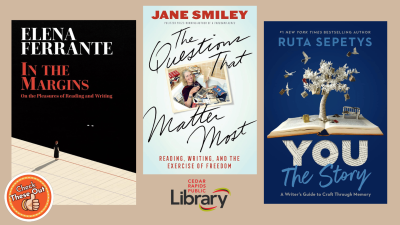Nov. 7, 2024 – November is NaNoWriMo, aka National Novel Writing Month. An idea that began in 1999, NaNoWriMo participants aim to write the 50,000 words for a first draft of a novel in just 30 days.
Participants include people writing for their own pleasure as well as published novelists. Whether you're looking to complete the challenge and write your first book or just want to tap into the spirit of the month on a smaller writing project, Materials Librarian Allison Zordell has curated a list of books on the craft of writing to help you get started.
Browse the books below, and click on their covers to put them on hold in our catalog. Happy writing!
"In the Margins: On the Pleasures of Reading and Writing" by Elena Ferrante
A delightful collection of essays exploring reading and writing. "In the Margins" contains Elena Ferrante's latest reflections on literature, and the works and authors that have influenced her throughout her career.
"You: The Story: A Writer's Guide to Craft Through Memory" by Ruta Sepetys
A deeply personal how-to book for aspiring writers, encouraging them to look inward and excavate their own memories in order to discover the authentic voices and compelling details that are waiting to be put on the page.
"Yours Truly: An Obituary Writer's Guide to Telling Your Story" by James R. Hagerty
Someday, your life story is likely to be boiled down to a few lines. If you leave things to chance, your obituary is almost sure to be solemn, formulaic, and full of errors – an obligatory final chapter written in haste by others. James R. Hagerty, longtime obit writer for The Wall Street Journal, knows how to get the job done right: Do it yourself, starting now, while you still can. In this heartfelt and reassuring guide, Hagerty explains how to preserve your personal history – from crafting a brief obituary for newspapers and websites, to a more thoughtful and detailed mini-memoir for those close to you. Through his personal stories, on-the-job anecdotes, and insights, you will learn what to include, what to leave out, and how to provide historical context, record oral histories and make the most of details, all with candor and wit. Best of all, you'll find that reviewing your life story helps you think about what you're doing with your time on Earth and whether you're on the right path. It isn't too late to improve the narrative with a stronger ending. Telling your story your way can be the best gift you ever give to friends and loved ones – and yourself.
"1000 Words: A Writer's Guide to Staying Creative, Focused, and Productive All Year Round" by Jami Attenberg
The book extension of the growing writer’s movement and challenge to write 1,000 words a day helps readers and writers discover how to uncover their creative desires and stay motivated and offers advice from over 50 well-known writers.
"And Then? And Then? What Else?" by Daniel Handler
The author of the popular "Lemony Snicket" books discusses his love of strange literature and reflects on his life experiences in a memoir that also serves as inspiration for aspiring writers.
"Written: How to Keep Writing and Build a Habit that Lasts" by Bec Evans and Chris Smith
Applying research from neuroscience and psychology, and based on the authors' own practice and findings, "Written" will show you how to manage your time effectively, how to visualize and set successful goals, how to recover from setbacks, and ultimately how to create writing habits that work for you. Along the way, you'll hear inspiring and relatable stories from other writers who have overcome their struggles to find success. Each chapter ends with practical coaching exercises that you can start implementing right now.
"Truth is the Arrow, Mercy is the Bow: A DIY Manual for the Construction of Stories" by Steve Almond
Steve Almond employs the radical empathy he displayed as co-host (with Cheryl Strayed) of the podcast Dear Sugar to explore the joys and trials of storytelling, and to explode the myths that hold us back from writing our deepest and truest work. The book includes chapters on plot, character, and chronology, but travels far beyond the earnest intentions of most craft books. It includes essays on humor, sex, writer's block, and the dividends of failure, as well as prompts to generate new work and a rollicking Frequently Asked Questions section. You'll never think about writing the same way again.
"Write for Life: Creative Tools for Every Writer: A Six-Week Artist's Way Program" by Julia Cameron
Over the course of six weeks, Cameron carefully guides readers step by step through the creative process. This latest guide in the "Artist's Way" series introduces a new tool and expands on powerful tried and true methods, and gently guides readers through many common creative issues – from procrastinating and getting started, to dealing with doubt, deadlines, and "crazymakers." It will help you reach your goals, whether your project is a novel, poetry, screenplay, standup, or songwriting. With the learned experience of a lifetime of writing, Cameron gives readers practical tools to start, pursue, and finish their writing project.
"The Questions that Matter Most: Reading, Writing, and the Exercise of Freedom" by Jane Smiley
Essays that show how Smiley draws inspiration from across literary history to invigorate her own writing. Among the authors she examines are Marguerite de Navarre, Charles Dickens, Anthony Trollope, Harriet Beecher Stowe, Louisa May Alcott, Mark Twain, Willa Cather, Franz Kafka, Halldor Laxness, and Jessica Mitford
